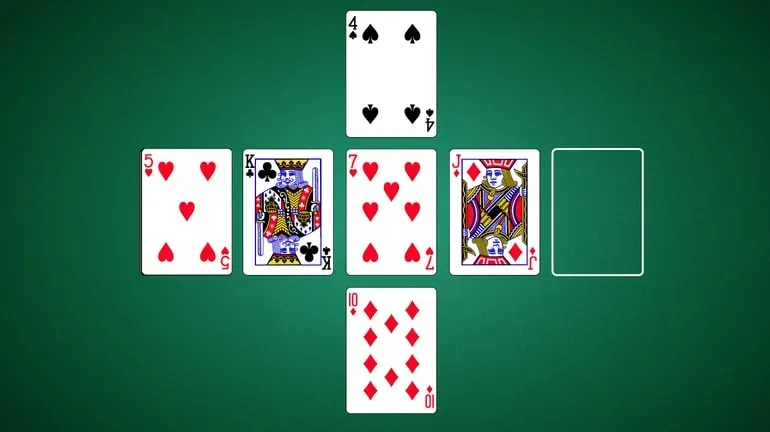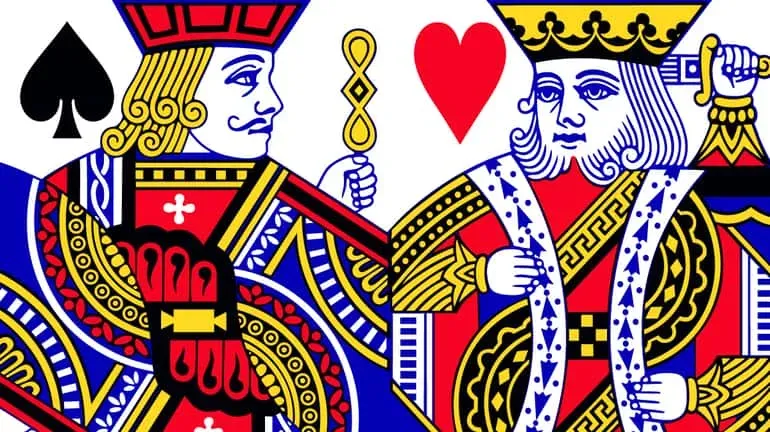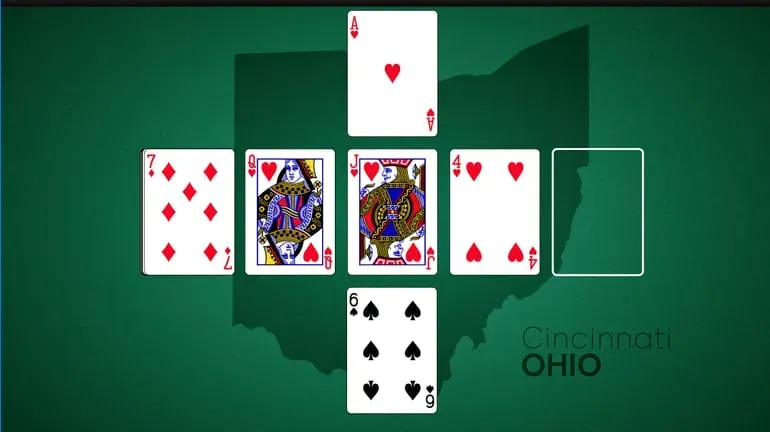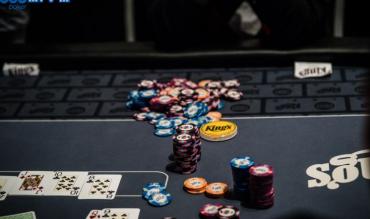Updated on July 13, 2023
Wild cards, matching the pot, and a fiery cross!
The game of poker offers much more than traditional poker games. While many players today are accustomed to more games played in a casino or poker room – games like Texas Holdem, Omaha, and Seven Card Stud – others may remember losing their shirts in a crazy home game.
Those games at the kitchen table or back room with all sorts of differing card numbers, wild cards, and other caveats make for some unique action at the tables.
Here’s a look at some of those games. Grab your lucky charm and don’t get too angry – in some of these games, suckouts are definitely on the menu.
#1 – Vanunu
This was one of Daniel Negreanu’s favourite games growing up in Toronto, and he’s referenced it often. Players are dealt all seven cards face down and roll their own, one at a time. Bets are made until there are five upcards and two downcards.
This card game then becomes a bit of an auction. Players can pitch a card back in, and buy another after the last card is dealt face up, paying a predetermined amount for an upcard and twice that for a downcard.
In Negreanu’s version, each player had to declare low, high, or both by dropping coins on the table simultaneously – one for low, two for high, or three for both. Players declaring both must win both ways, or they aren’t awarded any of the pot. Additionally, if there are only multiple low declarations, the best low hand scoops the entire pot with no high hand. It’s a unique game with many variables.
So, this one can go from High-Low to Lowball, and players better get those declarations right. Declaring both ways and then missing – that can be costly. Hopefully, you’ll have Daniel’s reads and rake plenty of pots.
#2 – Pineapple and Crazy/Lazy Pineapple
Pineapple poker has a “tropical twist” on traditional Texas Hold’em and has become much-loved by many. In Pineapple, a player is dealt three cards and then discards one before the first round of betting. The betting continues like in traditional Texas Hold’em.
In Crazy Pineapple, players don’t discard until after the flop. All other rules of Hold’em then apply. In Lazy Pineapple, players can hold onto the three cards and then discard one after the river and last round of betting.
What’s the catch? The extra card and discard element add an extra twist, and it inevitably seems like a player pitches the wrong card back into the muck. You may have kept that top pair, but that discarded card may have brought a straight. That deuce tossed in the muck may have turned into trips with runner-runner 2s.
It’s enough to drive you crazy, but a fun game nonetheless – and maybe worth serving up a nice frozen one too along with the poker. Enjoy!
#3 – Criss Cross, Fiery Cross, or Iron Cross

There can be some significant anticipation in this game. Each player is dealt four cards, and five cards are also dealt face down in a “cross” formation in the centre of the table. After a round of betting, one of the outside cards is turned up. Betting then continues, and this pattern continues until only the centre card is face down.
The centre card is turned last, and a final bet is made. Players have the option to use two, three, or four of their cards and either the vertical or horizontal cards on the board and two of their own.
There are numerous variations. Some allow for players to use more than two of their hole cards or feature a high/low split. Another common addition is to make the centre card wild – making for some interesting showdowns. That centre card could change your hand entirely – good or bad. What had been a solid hand, can now be a costly loser.
#4 – Irish Poker
This game combines a bit of Texas Hold’em and Omaha – and, hopefully, a little luck of the Irish when it comes to your own hand. Players begin with four cards and betting follows pre-flop in the traditional style.
However, after the betting on the flop, players must discard two cards. The game is then played out as in Hold’em. The discarding makes for some unique opportunities to cobble together a hand, but would those two cards you threw away have made a better hand once the turn and river are dealt?
No doubt, there will be plenty of thoughts like this at the table:
“Damn, I’d have made a full house!”
“Those two spades on the turn and river would have made me the nut flush if I’d kept that King. Argh!”
Irish poker has a bit more swing than Hold’em, and the above statements are all part of the fun. Just really think about those cards you’re sending back.
#5 – Black Mariah or Low Chicago

Sometimes it pays to do nothing more than get lucky. That certainly applies in these games. Black Mariah and Low Chicago are versions of Seven-Card Stud. In Black Mariah, the player with the high spade in the hole wins half the pot. That’s it. No three-betting, slow playing, or in-depth analysis about any hand. Just get lucky enough to be dealt that low spade and then keep that pot building – half of it is yours.
This was a favourite of Phil Hellmuth growing up in Wisconsin. It must have been an interesting sight to see the Poker Brat’s 3♠ beaten by the 2♠. That might have brought a bit of a rant. The game is also often called Low Chicago with High Chicago being the opposite – the player with the highest spade in the hole splitting the pot. This may not involve a lot of skill, but it can make for some big pots.
Some players add a side pot to these games instead of splitting the pot. Hellmuth’s games got even crazier, often with Deuces, One-Eyed Jacks, and Suicide Kings as wild cards. The name “Black Mariah” may derive from the villain in the Luke Cage Marvel comics. In the game, however, Black Mariah is a hero – and can bring you plenty of profits.
#6 – Badugi
Be prepared to get confused or frustrated. This game has gained more popularity in recent years with its inclusion in some of the mixed games tournaments at the World Series of Poker and in the WSOP 2023, Badugi had dedicated bracelet events for the first time. But it's certainly different from traditional poker.
Badugi is a lowball game in which players are dealt four cards. The game is played with blinds and features three drawing rounds. After betting, a player can keep all his cards (called standing pat) or discard some or all.
Play continues until all players have folded except one, or the third drawing round is completed. The goal is to make the lowest hand possible without a pair and all cards of a different suit. For example, A♥ 2♣ 3♦ 4♠ would be the lowest possible Badugi. A hand with a pair or second card of the same suit, such as A♥ 2♣ 3♦ 7♣ or 6♥ 7♣ 8♦ 8♠, would only qualify as a three-card Badugi. Either of these hands would lose to a completed four-card Badugi. Straights and flushes don't count towards making a hand in Badugi.
And that’s what can be frustrating. You may have A♥ 2♣ 3♦, and then keep drawing another diamond, club, or heart – ouch!
Ready to mix this poker game up even more? Badeucy is a combination of Badugi and 2-7 Triple Draw. Like Badugi, it features three rounds of betting and drawing. The game splits the pot between the best four-card Badugi hand and the best five-card 2-7 hand. However, Aces count high in this game, so the best Badugi hand would start with a 2, hence the name of the game. For example, a player holding 2♣ 3♥ 4♠ 5♦ 7♦ would have the nuts in both Badugi and 2-7 – with the 2♣ 3♥ 4♠ 5♦ as the best possible Badugi.
The challenge is that an extra card makes it easier for players to make some lower Badugi hands. Higher Badugis will not win as often, so that can be a challenge, especially in a game where players making solid hands will continue to bet and grow the pot.
It’s a challenging game that makes you think, but can be costly if you hang on too much hoping to outdraw opponents. Think low in this Lowball/Lowball split pot game. Got all that?
#7 – Anaconda
Pass, pass, roll those cards. This is a bastardised version of Seven-Card Stud in which players are dealt seven cards face down. There is a round of betting and players then pass three cards to a player to the left or right (determined by the dealer). After another round of betting, players then pass two cards, and then finally one last card after another round of betting.
Players then place their best five cards in a stack face down. Cards are exposed one at a time followed by a betting round until all five are exposed. Some players play with only two rounds of card passing, and it’s also often played as a high-low split.
It can be a frustrating affair. You’ll often have to break up an already nicely setup hand. And when you try going low, your neighbours will inevitably pass you plenty of high cards.
Where did the name come from? That may be lost with time, but perhaps it’s about the long time for betting or the snake of cards working their way around the table. Whatever the inspiration, it can be a fun game with plenty of action.
#8 – Three-Card Guts
This game can take some real courage – and quickly empty your wallet. In this unique poker variant, players are dealt three cards and can decide whether to play their hand or not by simultaneously dropping a chip in the centre of the table. The winner takes the pot, and the losers match it. For example, if three players stay and there is $5 in the pot, the two losers each pony up making for a new $10 pot.
The process repeats until only one player is raking the entire pot. The game builds some significant action and fun. Winning those big pots takes some guts as the name implies, and pots can really balloon if several players stay in and have to match the pot.
What started as a $10 pot becomes $40 if four players stay in. If three more then stay, that becomes $120. If three more remain? Well, you see where this is going. Have you got the guts?
#9 – Cincinnati

Here’s yet another geographically named poker game. In this one, each player is dealt five cards face down. Five cards are also dealt face down in the middle of the table with each exposed one at a time, followed by a round of betting. After the final round, players use any of their hole cards and those on the board to make their best five-card hand.
This isn’t Big O – you have five cards to make your best hand. It can make for some huge hands! Be ready to have your flush or straight beaten regularly. Don’t be a lamebrain.
Speaking of lamebrains, an alternate version is known as Lamebrain Pete, and the lowest card on the board is considered wild – making for an even crazier twist on an already crazy game as players hope one of their low cards ends up being wild.
#10 – 2 and 22
No man’s land out in the middle won’t work in this one. This split pot game is quite a bit different from regular poker games. An Ace can be used as 1 or 11 as in Blackjack. However, face-card count as half. Players are dealt one card face down, and one card face up. The goal is to get as close to 2 or 22 to split the pot. After being dealt two cards, there is a round of betting and players can decide to take another or stand-pat.
Players who pass three times are locked and can’t take more cards. After everyone is locked or no one takes a card, there is a showdown. The added fun in this one may be the unique bluffing. Players with a low up card tend to bet at a pot and at least bluff at the low. If no one else has a high up card, that makes for a smart play. A player may have a King up but still have a high card underneath. The savvy bluffer may actually win the low with a 10-1/2.
A player dealt a 2 down, and a King up has 2-½, an excellent hand. Also, a lucky player dealt Ace-Ace will win the pot both ways and certainly be looking to build the pot. There can be some added frustrations. In this game, low beats high so a player with 21-½ would top a player with 22-½ – and 2-½ would be topped by 1-½. Also, a player going high may be close to that completed hand and keep getting low cards, and then boom – a 10 hits your hand and ruins it all. There are numerous variations, but it’s a fun game to shake things up.
#11 - Mexican Sweat
Mexican Sweat makes decision-making in Hold'em seem like a walk in the park. In this game, each player is initially dealt seven hole cards and then two cards are dealt face up in the middle of the table. The first card is the kill card, which means that any hand with this card must be folded immediately. The second is the card to beat. The players may not look at their cards.
After the initial deal, the player to the left of the dealer is the first one to act. They begin revealing their hole cards, one at a time with the objective of beating the high card in the middle. For example, let's say the card in the middle is an 8. The player would need to flip a 9 or higher, a pair of any rank, a flush, a straight etc. If they turn another 8, it's not enough to beat the 8 in the middle.
When the player successfully beats the card in the middle, they immediately stop revealing cards. A betting round begins, led by the active player and, after it's done, the player to the left starts flipping their cards. This time, though, they're not trying to beat the high card in the middle, but the exposed portion of the hand of the player that precedes them.
But there's another twist. Remember the kill card? If a player reveals a card of the same rank as the kill card, they must fold immediately and forfeit the possibility of winning the pot. Now imagine knowing as much about your hand as your opponents and having to bet based on that. Hard enough for you?
#12 - Follow the Queen
If you're a fan of Seven Card Stud, you will love this one. Follow the Queen plays out just like a Stud game. Each player is dealt 2 cards face down and 1 card face up. This is followed by a betting round that is started by the player with the lowest face-up card. Then each player gets dealt another face up card, one by one, until each has 7 cards total, with a betting round in between each deal.
The twist? There are wild cards. Every Queen that is dealt face up becomes a wild card and the card dealt after the Queen also becomes wild for every player. So let's say a player is dealt a Queen and the next player is dealt a deuce. Now Queens and Deuces are wild and any player with a Deuce has a wild card. If another Queen is flipped, then the previous wild card is no longer wild and the one dealt after that Queen becomes the new wild card for everyone who holds one.
And that's the fun of it! Not only do you need to account for what each opponent might have considering their up-cards, but now you also need to consider the possibility of wild cards coming into play. Can you imagine your friends whining each time a Queen changes everything?
Find out how to set up a private home game on 888poker for you and your friends to play.
Originally Published on July 31, 2019


